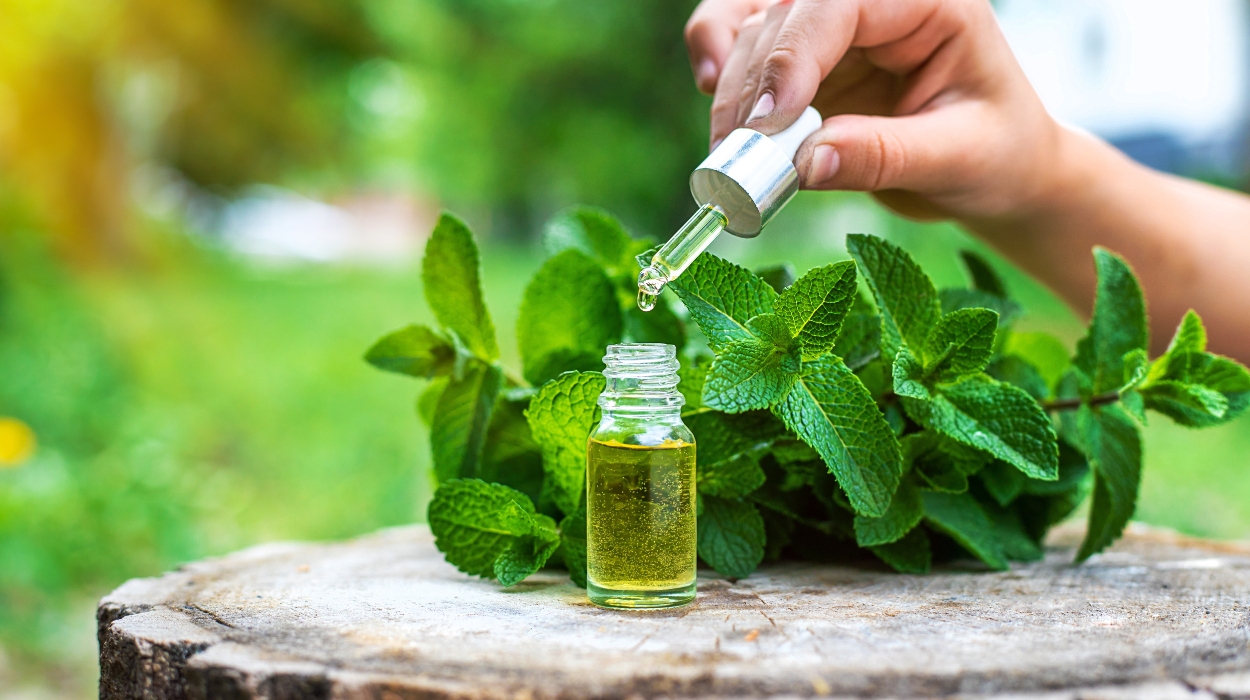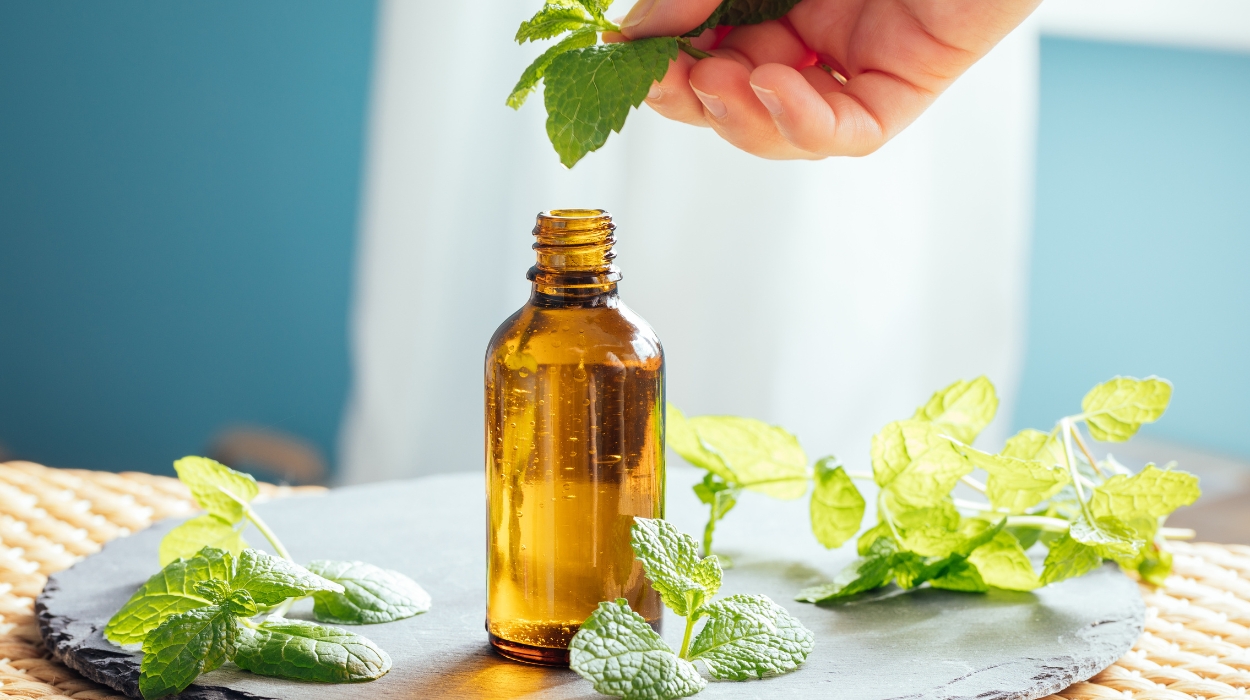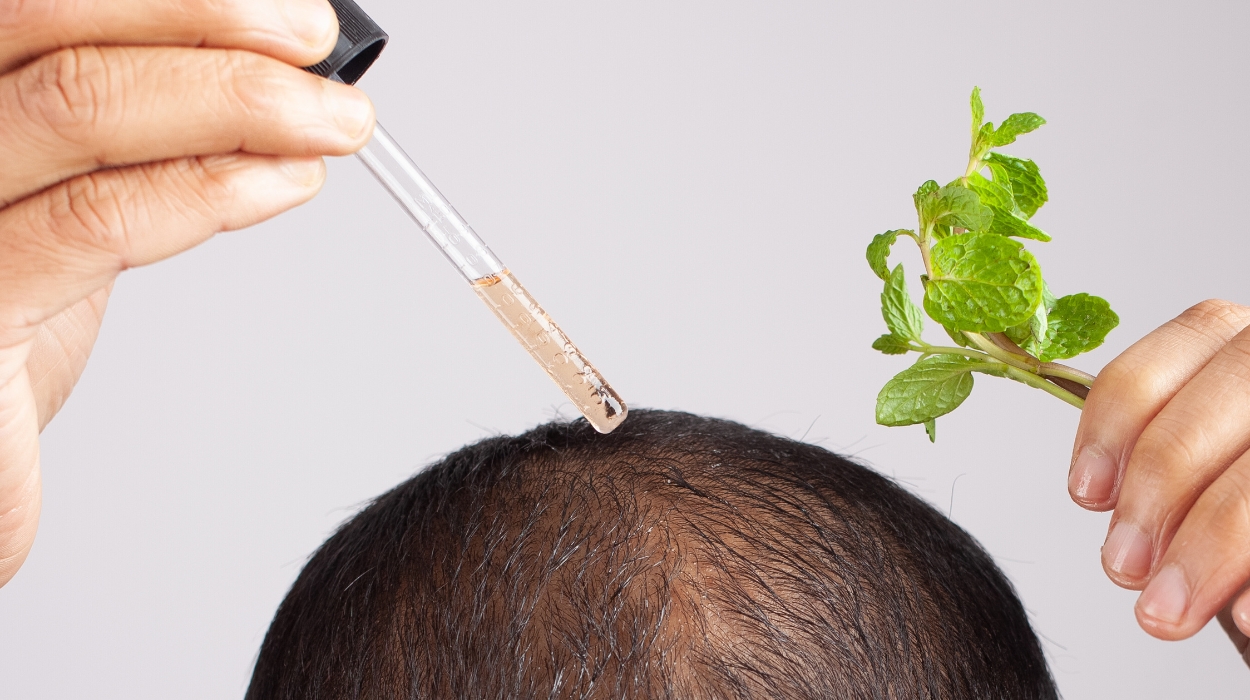 Expert's opinion
Expert's opinion
Expert's opinion
The article is a subjective view on this topic written by writers specializing in medical writing.
It may reflect on a personal journey surrounding struggles with an illness or medical condition, involve product comparisons, diet considerations, or other health-related opinions.
Although the view is entirely that of the writer, it is based on academic experiences and scientific research they have conducted; it is fact-checked by a team of degreed medical experts, and validated by sources attached to the article.
The numbers in parenthesis (1,2,3) will take you to clickable links to related scientific papers.
Peppermint Oil For Hair 2024: Benefits, Side Effects & How To Use

Having a head full of shiny, healthy hair can support good self-esteem[1] and confidence. Many people struggle with hair loss or hair thinning and wonder what methods and products out there can stimulate hair growth.
Peppermint oil for hair is a product worth looking into. This essential oil has been shown to be beneficial for health, but is peppermint oil good for hair growth and hair health? Keep reading to find out.
Is Peppermint Oil Good For Your Hair?
- Peppermint oil is not an approved treatment for hair loss but can be used as a supplementary treatment
- Peppermint oil has antifungal activity and promotes a healthy scalp
- Potentially able to provide ultraviolet ray protection
Benefits Of Peppermint Oil For Hair
Many factors contribute to a healthy scalp and hair, including the nutrients you consume and the products you use.
Hair Growth
A 2014 study[2] investigated if peppermint oils could promote hair growth amongst mice with hair loss. The mice were given a topical application of 3% peppermint oil, saline, jojoba oil, or 3% minoxidil over four weeks.
The study determined that the mice receiving the 3% peppermint oil had the best hair growth results, for example, it helps increase hair thickness, hair follicles, and follicle depth.
While these results are exciting, it is important to remember that more research that includes human trials is required to determine the effectiveness of peppermint oil in stimulating hair growth in humans.
A recent 2021 review[3] examined the effectiveness of using plant oils to treat androgenetic alopecia, the medical term for female and male pattern baldness.
While this study did not look at peppermint oil specifically, it did conclude that plant-based hair oils are best suited to be complementary supplements to prescriptions or conventional treatments due to limited studies showing solid evidence for these oils.
So, does peppermint oil help hair growth? Currently, only oral finasteride, topical minoxidil, and low-level laser therapy are approved for hair loss treatment by the Food and Drug Act.
Therefore, it is best to stick to a hair product or medication for hair proven to work and use essential oil as a supplement if desired.
Antifungal Activity
A 2013 study[4] investigated the antifungal effect of peppermint essential oil on the basidiomycetous yeast Trichosporon species. This is relevant to hair health as yeast can cause white piedra, which is a superficial fungal infection of the hair shaft.
The results showed peppermint essential oil had a high degree of anti-yeast activity against the Trichosporon species tested. This indicates peppermint essential oil could be used to treat fungal infection of the hair shaft, ensuring a healthy scalp.
Hair Protection
Similarly to our skin, our hair can be damaged by ultraviolet rays[5] from the sun. While the melanin in hair shafts protects against ultraviolet radiation, it only partially avoids the degradation of hair protein.
Sun exposure can cause split ends, can make hair dry and brittle, and cause hair to lack color and luster. This can cause deterioration of the hair shaft, making your hair more susceptible to breakage.
While there have not been any studies showing peppermint oil can provide ultraviolet protection for hair, a 2022 review study[6] reported peppermint oil has a high sun protection factor for the skin. This means peppermint essential oil could potentially protect the hair from the sun as well.
While these are exciting findings, further research is needed on this topic as the original study was a lab study, and there has not been any human research specific to hair.
What Is Peppermint Oil?

Peppermint oil[7] is derived from the peppermint herb, which is a cross-breed of water mint and spearmint. This plant is grown throughout Europe and North America.
Peppermint is a very versatile product as it is a common flavoring agent in foods and beverages. It can be a fragrance added to cosmetics, and both peppermint essential oil and peppermint leaves can be used for health purposes.
The use of peppermint oil for health purposes is nothing new, ancient records from Greece, Rome, and Egypt show this essential oil has been used to treat digestive disorders and other ailments for thousands of years.
Peppermint is still used today to treat digestive disorders such as irritable bowel syndrome, as well as the common cold, sinus infections, and headaches.
It is promoted to be used topically by applying it onto the skin for muscle aches, headaches, and itch. It has also been touted for coughs, colds, pain reduction, mental function enhancements, and stress reduction using peppermint oil as aromatherapy.
While we now know about the health benefits and many uses of peppermint essential oil, can we use peppermint oil for hair growth? Is peppermint oil good for your hair? Let’s delve into the research on peppermint oil for hair benefits and see if you can use peppermint oil for hair loss.
How To Use Peppermint Oil For Hair Growth?

As mentioned in an earlier section of this article, oral finasteride, topical minoxidil, and low-level laser therapy have been approved by the Food and Drug Act for hair growth products.
If desired, peppermint oil can still be used as a supplemental therapy for hair regrowth. However, you may be wondering how to use peppermint oil for hair and to promote hair growth.
Hair products with peppermint essential oil that can be used as a supplementary treatment are abundant and can be worked into any part of your hair care routine. This can include shampoo, scalp massage oil, hair masks, and conditioners.
Remember to be mindful of your hair type when selecting the hair product you want to try. Specific products can help with brittle hair, sensitive scalps, oily hair, and keeping your hair nourished.
The instructions for using each hair product with peppermint oil infused in it will vary, so it is best to follow the instructions for the specific product you purchased.
Can You Put Peppermint Oil In Hair?
Yes, you can either use it directly on your hair or dilute it with another carrier oil. For example, you can purchase pure peppermint essential oil and mix it with coconut oil.
Some peppermint essential oil products may be ready to use and don’t require diluting essential oils with carrier oils, so read the label and follow the instructions.
Whether you are using a ready-to-use or dilute oil, all you have to do is apply a few drops to your hair and massage it into your scalp and hair. Peppermint oil has a cooling sensation and may even become your new favorite scalp massage oil.
Side Effects Of Peppermint Oil
What are peppermint oils for hair side effects? Overall, the use of peppermint essential oil is low risk as it appears to be safe[2] when applied topically or if taken by mouth.
That being said, be aware that not all peppermint oil products can be taken orally. Be sure you only consume food-grade peppermint oil by mouth.
Is It Safe For Children And Infants?
It is recommended not to use peppermint essential oil on the faces of young children and infants, as inhaling menthol in the oil can have bad side effects. You should avoid using the oil in their hair as well.
It is also important to note that little is known about the safety of using peppermint oil during pregnancy and while breastfeeding. If you have questions or concerns, speak with your primary healthcare provider.
Skin Reactions
There is a skin irritation or rash risk when trying out a new cosmetic product. To reduce the risk of having a bad reaction, you should consider doing a patch test before trying out any new product.
Completing a patch test is simple. All you have to do is put a small amount of the product onto an area of your skin where it will be easily rubbed off or washed away to ensure it has skin contact for 24 hours.
Let 24 hours pass, and if you have not had a reaction, you are likely safe to continue using the product.
Other Essential Oils Good For Hair
While peppermint essential oil provides numerous hair benefits, there are other essential oils you could check out as well!
- Rosemary essential oil may stimulate hair growth.[8]
- Argan oil showed a pre-treatment[9] and post-treatment[10] protective effect on hair.
- Tea tree oil may help with dandruff[11] and head lice.[12]
- Red ginseng oil[13] may help with the hair growth cycle.
- Pumpkin seed oil[14] demonstrated an anti-hair loss effect.
Conclusion
Peppermint oil is much more than a simple household oil. This essential oil provides many benefits for your hair and can help keep your scalp healthy. This oil could definitely be a great addition to any hair care routine.
+ 14 sources
Health Canal avoids using tertiary references. We have strict sourcing guidelines and rely on peer-reviewed studies, academic researches from medical associations and institutions. To ensure the accuracy of articles in Health Canal, you can read more about the editorial process here
- Dhami, L. (2021). Psychology of Hair Loss Patients and Importance of Counseling. Indian Journal of Plastic Surgery, [online] 54(04), pp.411–415. doi:https://doi.org/10.1055/s-0041-1741037.
- Ji Young Oh, Min Ah Park and Young Chul Kim (2014). Peppermint Oil Promotes Hair Growth without Toxic Signs. Toxicological Research, [online] 30(4), pp.297–304. doi:https://doi.org/10.5487/tr.2014.30.4.297.
- Nestor, M.S., Ablon, G., Gade, A., Han, H. and Fischer, D.L. (2021). Treatment options for androgenetic alopecia: Efficacy, side effects, compliance, financial considerations, and ethics. Journal of Cosmetic Dermatology, [online] 20(12), pp.3759–3781. doi:https://doi.org/10.1111/jocd.14537.
- Uniyal V;Saxena S;Bhatt RP (2013). Screening of some essential oils against Trichosporon species. Journal of environmental biology, [online] 34(1). Available at: https://pubmed.ncbi.nlm.nih.gov/24006802/
- Catarina Marques Fernandes, Medronho, B., Alves, L. and Rasteiro, M.G. (2023). On Hair Care Physicochemistry: From Structure and Degradation to Novel Biobased Conditioning Agents. Polymers, [online] 15(3), pp.608–608. doi:https://doi.org/10.3390/polym15030608.
- Zhao, H., Ren, S., Yang, H., Tang, S., Guo, C., Liu, M., Qiu, T., Ming, T. and Xu, H. (2022). Peppermint essential oil: its phytochemistry, biological activity, pharmacological effect and application. Biomedicine & Pharmacotherapy, [online] 154, pp.113559–113559. doi:https://doi.org/10.1016/j.biopha.2022.113559.
- NCCIH. (2019). Peppermint Oil. [online] Available at: https://www.nccih.nih.gov/health/peppermint-oil#:~:text=What%20Do%20We%20Know%20About,abdominal%20pain%2C%20and%20dry%20mouth.
- Panahi (2015). Rosemary oil vs minoxidil 2% for the treatment of androgenetic alopecia: a randomized comparative trial. Skinmed, [online] 13(1). Available at: https://pubmed.ncbi.nlm.nih.gov/25842469/.
- Sharifi, N., Sanaz Hamedeyazdan, Javad Shokri and Farnaz Monajjemzadeh (2022). Argan oil as a pretreatment of human hair before exposure to oxidative damage: Attenuated total reflectance and protein loss studies. Journal of Cosmetic Dermatology, [online] 21(10), pp.5010–5017. doi:https://doi.org/10.1111/jocd.14885.
- Pamella Mello Faria, Luciana Neves Camargo, Siqueira, R. and Gama, R. (2013). Hair Protective Effect of Argan Oil ( Argania spinosa Kernel Oil) and Cupuassu Butter ( Theobroma… [online] ResearchGate. Available at: https://www.researchgate.net/publication/273687487_Hair_Protective_Effect_of_Argan_Oil_Argania_spinosa_Kernel_Oil_and_Cupuassu_Butter_Theobroma_grandiflorum_Seed_Butter_Post_Treatment_with_Hair_Dye.
- Borda, L.J. and Wikramanayake, T.C. (2015). Seborrheic Dermatitis and Dandruff: A Comprehensive Review. Journal of clinical and investigative dermatology, [online] 3(2). doi:https://doi.org/10.13188/2373-1044.1000019.
- Abrha, S., Tesfaye, W., Christenson, J.K., Carson, C. and Thomas, J. (2022). Antiparasitic Activity of Tea Tree Oil (TTO) and Its Components against Medically Important Ectoparasites: A Systematic Review. Pharmaceutics, [online] 14(8), pp.1587–1587. doi:https://doi.org/10.3390/pharmaceutics14081587.
- Truong, V.-L., Keum, Y. and Jeong, W.-S. (2021). Red ginseng oil promotes hair growth and protects skin against UVC radiation. Journal of Ginseng Research, [online] 45(4), pp.498–509. doi:https://doi.org/10.1016/j.jgr.2020.12.008.
- Veerawat Teeranachaideekul, Warisara Parichatikanond, Varaporn Buraphacheep Junyaprasert and Boontida Morakul (2022). Pumpkin Seed Oil-Loaded Niosomes for Topical Application: 5α-Reductase Inhibitory, Anti-Inflammatory, and In Vivo Anti-Hair Loss Effects. Pharmaceuticals, [online] 15(8), pp.930–930. doi:https://doi.org/10.3390/ph15080930.

